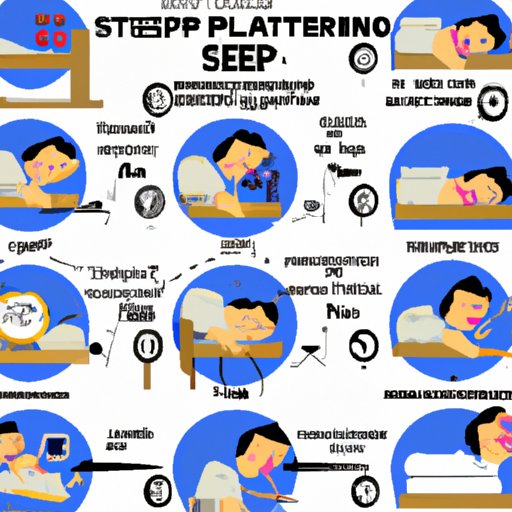Introduction
For many people, getting eight hours of sleep each night is essential for feeling rested and productive during the day. However, some individuals may find that they need more than eight hours of sleep, often up to twelve hours, in order to feel well-rested. This article will explore why some people may require 12 hours of sleep per day, looking at potential causes, health benefits, and consequences. It will also examine possible treatments to manage chronic sleepiness.
Analyzing the Causes of Excessive Sleepiness
There are several factors that can contribute to excessive sleepiness and the need for 12-hour sleep cycles. These include biological, psychological, and environmental factors.
Biological Factors
The body’s circadian rhythm, or internal clock, plays an important role in determining how much sleep is necessary. If the body’s internal clock is out of sync with the external environment, it can cause excessive sleepiness. In addition, certain medical conditions, such as depression and sleep apnea, can interfere with the body’s ability to get quality sleep, resulting in the need for longer sleep cycles.
Psychological Factors
Stress, anxiety, and other mental health issues can interfere with sleep patterns, leading to excessive sleepiness. In addition, some medications used to treat mental health conditions can also have side effects that cause drowsiness and fatigue.
Environmental Factors
Certain environmental factors can also contribute to excessive sleepiness, including noise levels, light exposure, and temperature. For example, too much light exposure in the evening can disrupt the body’s natural circadian rhythm and lead to difficulty falling asleep. Additionally, working long hours or having an inconsistent sleep schedule can make it difficult to get enough restful sleep.

Exploring Possible Health Benefits of Longer Sleep
Although 12-hour sleep cycles may seem excessive, there are some potential health benefits associated with longer sleep. These benefits include both physiological and mental health benefits.
Physiological Benefits
Longer sleep cycles have been linked to improved cardiovascular health, increased immunity, and better metabolic functioning. In addition, longer sleep has been found to be beneficial for muscle recovery and tissue repair. Finally, research suggests that longer sleep cycles may help protect against certain diseases, such as diabetes and obesity.
Mental Health Benefits
Longer sleep cycles have also been associated with improved mental health. Studies have found that longer sleep can reduce stress levels, improve memory, and increase focus and concentration. Additionally, longer sleep has been linked to a lower risk of depression and anxiety.

Examining How to Combat Excessive Sleepiness
If you are experiencing excessive sleepiness and 12-hour sleep cycles, there are some steps you can take to combat this issue. First, it is important to establish a consistent sleep schedule. Going to bed and waking up at the same time each day can help regulate the body’s internal clock and promote better sleep quality. Additionally, it is important to avoid napping during the day, as this can interfere with nighttime sleep. Finally, limiting caffeine intake can help reduce feelings of fatigue and sleepiness during the day.
Evaluating the Impact of 12-Hour Sleep Cycles on Daily Life
12-hour sleep cycles can have a significant impact on daily life. One of the most common effects is a decrease in energy levels, which can make it difficult to complete tasks and stay productive. Additionally, 12-hour sleep cycles can affect mood, making it difficult to maintain positive relationships. Finally, 12-hour sleep cycles can interfere with work or school performance, making it difficult to succeed in these areas.
Investigating the Effect of Stress and Other Factors on Sleep Patterns
In addition to 12-hour sleep cycles, stress and other factors can also have an impact on sleep quality. Stress can interfere with sleep by increasing cortisol levels, which can make it difficult to fall asleep and stay asleep. Diet and exercise can also affect sleep patterns. Eating a healthy diet and exercising regularly can help promote better sleep quality, while eating a poor diet and not exercising can lead to insomnia and other sleep disorders.

Assessing Potential Treatments for Chronic Sleepiness
If lifestyle changes and other interventions do not help reduce excessive sleepiness, there are several treatments available. Medication, such as sedatives or antidepressants, can be prescribed to help regulate sleep cycles. Additionally, cognitive-behavioral therapy, which focuses on changing negative thinking patterns and behaviors, can help improve sleep quality. Finally, there are some alternative treatments, such as acupuncture and yoga, that can help reduce stress and promote better sleep.
Comparing the Pros and Cons of 12-Hour Sleeping Cycles
When considering 12-hour sleep cycles, it is important to weigh the pros and cons of this type of sleep pattern. On the one hand, longer sleep cycles can provide some health benefits, such as improved immunity and mental health. On the other hand, longer sleep cycles can interfere with daily activities and cause fatigue and irritability.
Conclusion
In conclusion, 12-hour sleep cycles can be caused by a variety of factors, including biological, psychological, and environmental factors. Although there are some potential health benefits associated with longer sleep cycles, there are also some drawbacks. To combat excessive sleepiness, it is important to establish a consistent sleep schedule and limit caffeine intake. If lifestyle changes do not help, there are several treatments available, such as medication and cognitive-behavioral therapy. Ultimately, it is important to assess the pros and cons of longer sleep cycles and determine what works best for you.


